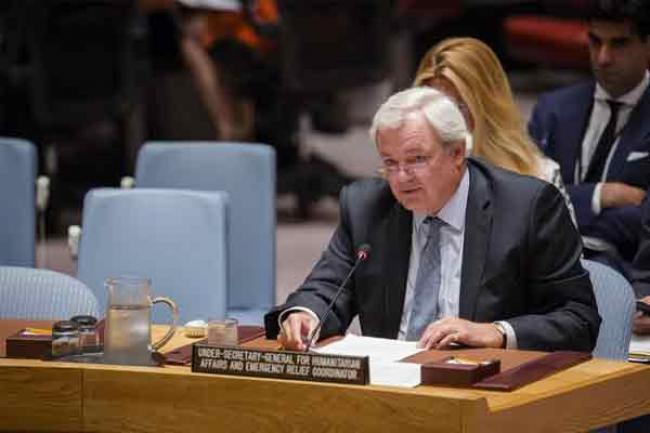Just Earth News 23 Aug 2016, 03:23 am Print

Manuel Elias
“I'm not going to pretend – I'm angry, very angry” about what is happening in Aleppo on Monday and throughout Syria over the last five years, said Stephen O'Brien, Under-Secretary-General for Humanitarian Affairs and Emergency Relief Coordinator in his briefing to the Security Council.
“This callous carnage that is Syria has long since moved from the cynical, to the sinful,” he said, warning that it is the failure of politics and the 15-member Council.
“So please: now is the moment, this instant, to put differences aside, come together as one, and stop this humanitarian shame upon us all, once and for all,” he told Council members.
Aleppo has become the “apex of horror” at its most horrific extent of the suffering of people, with up to 275,000 people in eastern Aleppo almost entirely cut off from vital supplies, while access also remains extremely difficult to the estimated 1.5 million people in western parts of the city, O'Brien said.
“This is a race against time, as fighting rages on,” he said, warning that Aleppo risks seeing a humanitarian catastrophe unparalleled in the over five years of bloodshed and carnage in the Syrian conflict.
Russia's announcement of support for 48-hour pause
Welcoming the announcement by Russia on 18 August to support the call for a 48-hour ceasefire, O'Brien said he and his office are working with all sides to seek to ensure that should the announcement by Russia translates into a comprehensive pause, that will enable aid to safely make its way to those who so desperately need it.
Russia and the United States are the co-chairs of the taskforces for humanitarian aid and a cessation of hostilities – created by the International Syria Support Group (ISSG), which comprises the UN, the Arab League, the European Union and 16 other countries – and which have been meeting separately since early this year on a way forward on the Syrian crisis.
A humanitarian pause is “not a negotiating tactic” but needed to put confidence into the hundreds of truck drivers to jump back in their cabs, load their trucks, and set off on the slow journey over shell-cratered roads, all the time wondering whether the sniper will take the shot, or an IED (improvised explosive device) will catapult them into the air.
“As we sit here round this safe table, humanitarian rescue workers are risking their lives in search for those buried under the debris,” he told Council members, noting that more than 130 'white helmets' volunteers have lost their lives since 2013, mostly caught in the so-called “double tap attacks,” in which a helicopter or a jet bombs a building, then waits some time – just enough for rescue and medical workers to arrive – before attacking again.
UN convoys await green light
He said that the UN and partners are ready to move assistance within 48 to 72 hours once the green light is given. “Plans are in place, but we need the agreement of all parties to let us do our job,” he said.
Outlining the plan, he said that 50 trucks of assistance are ready to move from western Aleppo into the east and preparation is under way for the cross-border movement of assistance into eastern Aleppo. An initial movement would send 20 trucks with much needed food into eastern Aleppo during the first pause. This would then be scaled up as appropriate for future pauses, and include additional humanitarian assistance based on assessed need.
According to the plan, the loading of items would be monitored by the UN Monitoring Mission, which would then seal the trucks so that any tampering would be evident on arrival, he said.
All trucks would include UN identifying markers. Once cleared, the trucks travel across the border into Syria along the same routes as used prior to 7 July. They travel along the Castello Road and into eastern Aleppo city directly to the warehouses of our partners. Once at the warehouses, trucks will be confirmed as not having been tampered with, and then the seals would be broken and assistance off-loaded, he said.
He began his briefing by saluting the life of Khaled Omar Harrah, a member of the White Helmets, killed on 11 August, by airstrikes. He is remembered for brushing aside debris and reaching through a hole in the wall to pull out a 10-day-old baby from the rubble of a collapsed building in 2014.
Citing the haunting images of five-year-old Omran Daqneesh, a silent face covered in blood and dust, after being pulled from the rubble caused by a recent airstrike, O'Brien told Council members that “imagine this was your child, a child that has known nothing but horrific war.”
“All we need is for the guns to fall silent,” he said, not the politicking and posturing, or the power games and defensiveness.
Progress has been made this year, with a net total of 1,275,750 people reached in besieged, hard-to-reach and priority locations across Syria. But regarding August inter-agency convoy plan submitted to the Syrian authorities, the UN was denied access to more than 50 per cent of requested beneficiaries, he said.
He reported that the Resident and Humanitarian Coordinator for Syria, Yacoub El Hillo ended his three-year appointment in Syria on Monday.
- India rejects allegations, urges Pakistan to tackle its ‘home-grown ills’
- Massacre in Islamabad: ISIS takes responsibility for deadly Pakistan blast
- Friday turns fatal: 31 dead, 169 injured in shocking Pakistan mosque blast
- Explosion at packed mosque in Pakistan turns Friday prayers into scene of carnage, 15 dead
- Security forces handicapped: Pakistan Defence Minister’s shock admission on Baloch violence





-1763561110.jpg)
